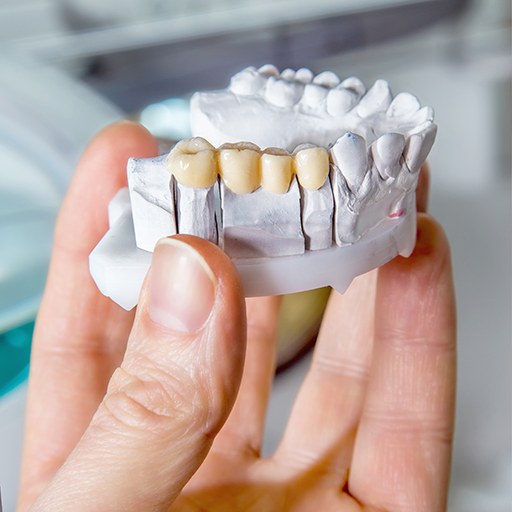Dental Bridges – Fort Worth, TX
Close the Gap and Restore Your Grin
Tooth loss can detract from your daily quality of life in several ways, especially if you’ve lost several teeth in a row and have a wider space in your smile. For instance, you might struggle to chew food or develop a lisp or other changes to your speech patterns. Plus, you might worry about being judged for your appearance and avoid spending time with others.
Fortunately, Dr. Neil can place a lifelike dental bridge to close the gap and restore your grin. Continue reading to learn more about this popular solution for tooth loss, and feel free to contact us for additional information.

Why Choose Karen Neil Fort Worth Dentistry for Dental Bridges?
- Dentist with 30+ Years of Experience
- Advanced Technology to Improve Patient Comfort
- Tooth-Colored Customizable Materials
What is a Dental Bridge?

A dental bridge contains the correct number of pontics, or artificial teeth, situated between two dental crowns to replace your lost teeth. They’re ideal for patients who have lost one to four teeth in a row, and anchor to healthy abutment teeth or specially placed dental implants on either side of the space left behind.
They’re typically made from resilient ceramic that reflects light like enamel and can be customized to match your natural teeth for seamless results. Once it’s cemented in place, it’s not intended to be removed, making it an excellent long-term solution that restores your smile’s appearance and functionality.
Types of Dental Bridges

Potentially, anyone who is missing one or more teeth can benefit from one of these oral appliances, but that doesn’t mean they’re the right treatment for everyone’s unique needs. Before proceeding, you must consult Dr. Neil to ensure you’re a good candidate. She’ll examine your mouth and recommend one of the following options based on her findings:
Traditional Dental Bridge
This is the tried-and-true version and involves cementing the crowns on each side of your restoration over the teeth on each end of the empty socket(s). Your dentist will need to remove a thin amount of enamel from the abutments for it to fit correctly, so if you have cavities or thinning enamel, Dr. Neil might recommend an implant bridge instead.
Implant Bridge
This method involves placing two titanium rods to anchor your dental bridge for a more permanent treatment. You must have a strong enough jawbone to support the dental implants, and it can take three to six months to recover afterward because your jaw must produce enough new bone growth to fuse with the metal.
The Benefits of Getting a Dental Bridge

There are several excellent reasons to get a dental bridge with our team in Fort Worth, including:
- Improved confidence. They are customized just for you to look and feel as lifelike as possible to improve your self-esteem.
- Enhanced enunciation. You’ll be able to overcome speech impediments that might have developed after tooth loss.
- Restored bite force. You’ll be able to eat a variety of wholesome foods to support your oral and general health.
- Easy maintenance. Brushing and flossing twice daily, and visiting our team every six months for a routine checkup and cleaning, is all that’s needed to keep you restoration in great shape.
- Resilient materials. Your bridge can last anywhere from 5 to 15+ years if cared for correctly, making it an excellent long-term repair.
Dental Bridges FAQs
How Long Should a Dental Bridge Last?
On average, dental bridges last between 5 and 15 years. One of the biggest factors in the longevity of yours is how well you care for it. That’s why we do our best to reinforce healthy habits, like brushing twice a day, avoiding tobacco products, and visiting our dentist in Fort Worth every six months for a checkup and cleaning.
Do Dental Bridges Look Natural?
Whether you’re replacing one missing tooth with a dental bridge or several teeth in an arch, you might be curious if it will draw any unwanted attention to your smile. The answer is “no!” Not only are durable and lifelike dental materials used to create your restoration, but everything from the shape to the size of each replacement tooth is custom-made with your dental needs, face shape, and smile goals in mind. So, the final result will be a dental bridge that seamlessly fills the gaps in your smile.
How Many Teeth Can a Dental Bridge Replace?
In addition to being able to replace one missing tooth, dental bridges can replace up to four missing teeth in a row. If you are missing five or more (or you’re missing several teeth throughout your mouth), then we will explore your other tooth-replacement options, like dental implants. That way, you have a complete smile that looks great, feels natural, and can stand up to daily wear.
What Can You Not Eat with a Dental Bridge?
Speaking of daily wear… your dental bridge will restore some of the strength of your bite so you can eat a varied, well-balanced diet again. Just make sure not to over-indulge on cavity-causing foods, like potato chips and ice cream. It’s equally as important that you steer clear of extremely crunchy and sticky snacks, such as hard pretzels and taffy. Instead, focus on incorporating smile-friendly foods into your diet, like cottage cheese, cooked carrots, and hard-boiled eggs.
Are Dental Bridges Covered by Insurance?
Some dental insurance providers do cover a portion of the cost of dental bridges, yes. So, if you haven’t already, take a look at the fine print on your plan to see if you have any available coverage! If you’re having trouble understanding your benefits or you’re not sure how to utilize them, don’t hesitate to let us know! While we’re not in-network with any dental insurance plans, we are more than happy to help our patients maximize their coverage.
Can Dental Bridges Get Cavities?
Since dental bridges are crafted from materials like dental porcelain, they cannot develop cavities. Of course, your natural teeth supporting your restoration still can, and your gums can develop an infection if they are neglected. So, it’s important that you continue to brush, floss, and rinse with mouthwash daily. Then, every six months, come to our office for a checkup and cleaning.
